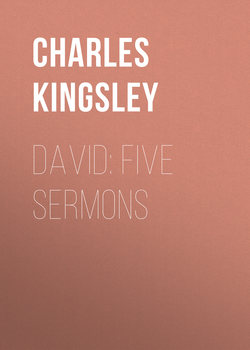Читать книгу David: Five Sermons - Charles Kingsley - Страница 3
SERMON II. DAVID’S STRENGTH
ОглавлениеPsalm xxvii. 1. The Lord is my light, and my salvation; whom then shall I fear? The Lord is the strength of my life; of whom then shall I be afraid?
I said, last Sunday, that the key-note of David’s character was not the assertion of his own strength, but the confession of his own weakness. And I say it again.
But it is plain that David had strength, and of no common order; that he was an eminently powerful, able, and successful man. From whence then came that strength? He says, from God. He says, throughout his life, as emphatically as did St. Paul after him, that God’s strength was made perfect in his weakness.
God is his deliverer, his guide, his teacher, his inspirer. The Lord is his strength, who teaches his hands to war, and his fingers to fight; his hope and his fortress, his castle and deliverer, his defence, in whom he trusts; who subdueth the people that is under him.
To God he ascribes, not only his success in life, but his physical prowess. By God’s help he slays the lion and the bear. By God’s help he has nerve to kill the Philistine giant. By God’s help he is so strong that his arms can break even a bow of steel. It is God who makes his feet like hart’s feet, and enables him to leap over the walls of the mountain fortresses.
And we must pause ere we call such utterances mere Eastern metaphor. It is far more probable that they were meant as and were literal truths. David was not likely to have been a man of brute gigantic strength. So delicate a brain was probably coupled to a delicate body. Such a nature, at the same time, would be the very one most capable, under the influence—call it boldly, inspiration—of a great and patriotic cause, of great dangers and great purposes; capable, I say, at moments, of accesses of almost superhuman energy, which he ascribed, and most rightly, to the inspiration of God.
But it is not merely as his physical inspirer or protector that he has faith in God. He has a deeper, a far deeper instinct than even that; the instinct of a communion, personal, practical, living, between God, the fount of light and goodness, and his own soul, with its capacity of darkness as well as light, of evil as well as good.
In one word, David is a man of faith and a man of prayer—as God grant all you may be. It is this one fixed idea, that God could hear him, and that God would help him, which gives unity and coherence to the wonderful variety of David’s Psalms. It is this faith which gives calm confidence to his views of nature and of man; and enables him to say, as he looks upon his sheep feeding round him, ‘The Lord is my Shepherd, therefore I shall not want.’ Faith it is which enables him to foresee that though the heathen rage, and the kings of the earth stand up, and the rulers take counsel together against the Lord and his Anointed, yet the righteous cause will surely prevail, for God is king himself. Faith it is which enables him to bear up against the general immorality, and while he cries, ‘Help me, Lord, for there is not one godly man left, for the faithful fail from among the children of men’—to make answer to himself in words of noble hope and consolation, ‘Now for the comfortless troubles’ sake of the needy, and because of the deep sighing of the poor, I will up, saith the Lord, and will help every one from him that swelleth against him, and will set him at rest.’
